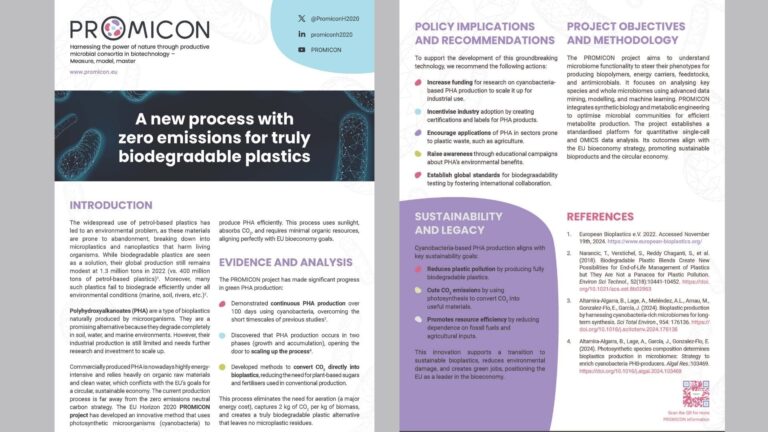Result description
The PROMICON project has made significant progress (https://doi.org/10.3897/arphapreprints.e147255) in green polyhydroxyalkanoates (PHA) production. It demonstrated continuous PHA production over 100 days using cyanobacteria, overcoming the short timescales of previous studies. Discovered that PHA production occurs in two phases (growth and accumulation), opening the door to scaling up the process. Developed methods to convert CO2 directly into bioplastics, reducing the need for plant-based sugars and fertilisers used in conventional production.
This process eliminates the need for aeration (a major energy cost), captures 2 kg of CO2 per kg of biomass, and creates a truly biodegradable plastic alternative that leaves no microplastic residues. This policy brief (https://doi.org/10.3897/arphapreprints.e147255) describes the new process, its potential applications and policy relevance.
Addressing target audiences and expressing needs
- To raise awareness and possibly influence policy
The new method (https://doi.org/10.3897/arphapreprints.e147255) uses cyanobacteria to produce polyhydroxyalkanoates (PHA), a type of bioplastic. To support it, PROMICON recommends:
– Increase funding for research on cyanobacteria-based PHA production to scale it up for industrial use.
– Incentivise industry adoption by creating certifications and labels for PHA products.
– Encourage applications of PHA in sectors prone to plastic waste, such as agriculture.
– Raise awareness through educational campaigns about PHA’s environmental benefits.
– Establish global standards for biodegradability testing by fostering international collaboration.
- EU and Member State Policy-makers
Result submitted to Horizon Results Platform by
Universitat Politècnica de Catalunya, Barcolena, Spain

